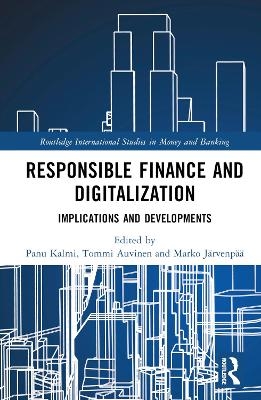
Responsible Finance and Digitalization
Routledge (Verlag)
978-0-367-70061-4 (ISBN)
The aftermath of the 2008 crisis has substantially increased the regulation of banks and insurance companies and curtailed their risk taking, which has shifted much of the risk to their clients: firms and consumers. At the same time, digitalization has encouraged the entry of new firms combining finance and technological innovation, a phenomenon known as FinTech. The emergence of non-bank financial entities has contributed to the fragmentation of financial services, and also opened up new markets. Furthermore, the growing emphasis on corporate social responsibility has made it increasingly important for financial organizations to care about their public image.
Drawing together these diverse strands, this book examines how the financial sector is evolving and how the existing actors are adapting to the institutional change and to the challenges from new actors and competitors. It also addresses the issue of how financial organizations are providing fixes to the challenges at the systemic level and how a healthier, more diverse and socially responsible financial sector is beneficial to the operations of the market economy as a whole. While there are books that address each of these issues, and also books that look at organizational diversity, there are few that investigate their interconnectedness.
Responsible Finance and Digitalization offers a topical overview of the changes that are taking place in the financial sector and how the financial sector itself can contribute to solving global challenges. It equips both students (at MBA and other levels) and practitioners with analytical tools to reflect on this change and to take appropriate action to ensure that their organization can successfully navigate it and create value.
Panu Kalmi (PhD) is a professor of economics at the University of Vaasa, Finland. His main research and teaching interests relate to financial literacy, economic education and banking. He is especially interested in the use of games and other active learning methods in economic education and works with schools to further financial literacy among the youth. Tommi Auvinen (PhD) is a senior lecturer and leading researcher in Management and Leadership at the Jyväskylä University, School of Business and Economics (JSBE), Finland, and a docent in narrative leadership research at the University of Lapland. His research focuses on leadership themes, including storytelling and discursive power and strategy-as-practice. Marko Järvenpää (PhD) is a professor of accounting at the University of Vaasa, School of Accounting and Finance, Finland. He studies management accounting with qualitative methods. His research focuses on roles of management accountants, management accounting change, performance measurement, sustainability, public sector, data analytics and theoretically on institutional and stakeholder theories.
1.Introduction Topic I: Organizational structures and mission in banking 2. Conventional or Alternative? How to Assess the Alternativeness of a Bank 3. Trends in Executive Compensation Across Bank Types 4. Risk Spillover Between Islamic and Conventional Banking Sectors 5. From Vernacular Accounting to Standardized PMS: Logic Multiplicity in a Cooperative Bank 6. Efficiency vs. Values: Institutional Logics, Situated Rationality and Performance Measurement in a Cooperative Bank Topic II: Digitalization shaping organizational and market boundaries 7. Digitalization Transformation in Banking: Customer Preferences, Bank Attitudes and Performance 8. Data Balance Sheet in OP Financial Group 9. Factors Inhibiting the Adoption Intention of Digital Payment Platform 10. Has Crowdfunding’s Potential Been Unleashed in the Baltics? Topic III: Regulation in changing financial sector landscape 11. Investor Protection Strategies in Crowdfunding Regulation: The 4i’s Model 12. Regulation and Development of Private Equity in Europe 13. Financial Institution’s Reporting Requirements and the Criteria for a Good Tax System Topic IV: Social responsibility in the financial sector 14. Sustainable and Responsible Investment Funds and Sustainable Transition 15. Banks and Credit Unions as Providers of Financial Literacy: A Complex Relationship 16. Organizational Identity Construction as a Control Mechanism
| Erscheinungsdatum | 14.09.2022 |
|---|---|
| Reihe/Serie | Routledge International Studies in Money and Banking |
| Zusatzinfo | 26 Tables, black and white; 20 Line drawings, black and white; 2 Halftones, black and white; 22 Illustrations, black and white |
| Verlagsort | London |
| Sprache | englisch |
| Maße | 156 x 234 mm |
| Gewicht | 707 g |
| Themenwelt | Wirtschaft ► Betriebswirtschaft / Management ► Finanzierung |
| Betriebswirtschaft / Management ► Spezielle Betriebswirtschaftslehre ► Bankbetriebslehre | |
| Wirtschaft ► Betriebswirtschaft / Management ► Unternehmensführung / Management | |
| Wirtschaft ► Volkswirtschaftslehre ► Makroökonomie | |
| ISBN-10 | 0-367-70061-1 / 0367700611 |
| ISBN-13 | 978-0-367-70061-4 / 9780367700614 |
| Zustand | Neuware |
| Informationen gemäß Produktsicherheitsverordnung (GPSR) | |
| Haben Sie eine Frage zum Produkt? |
aus dem Bereich


